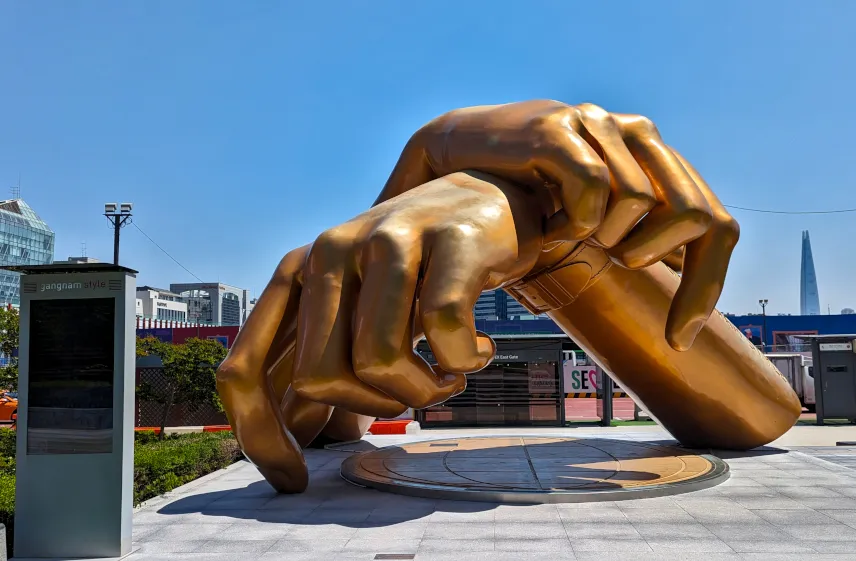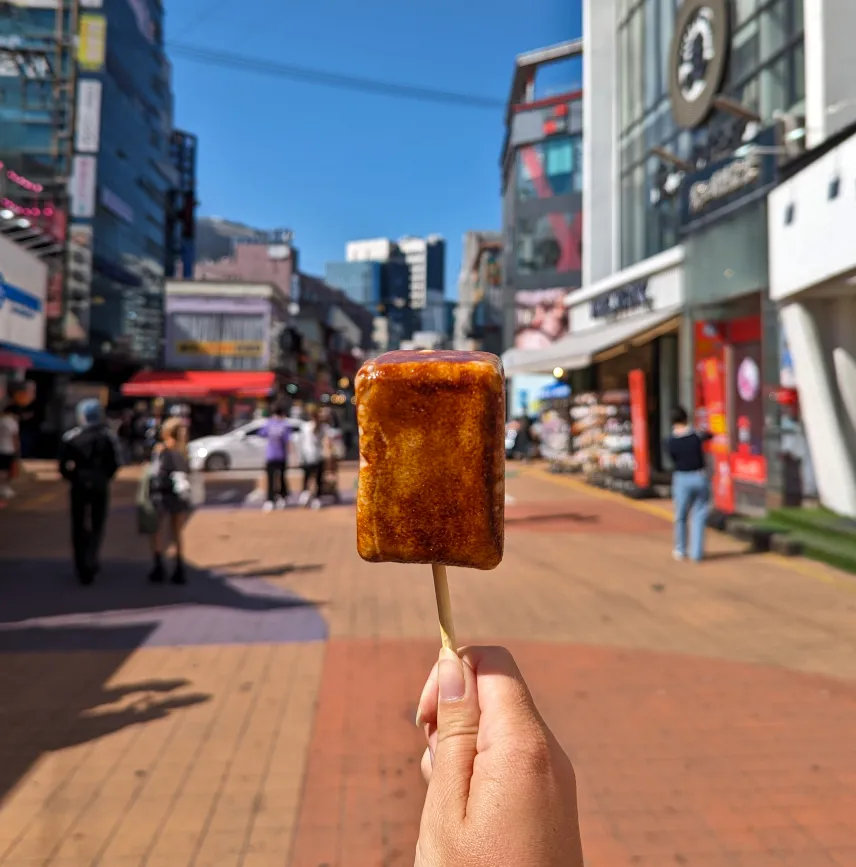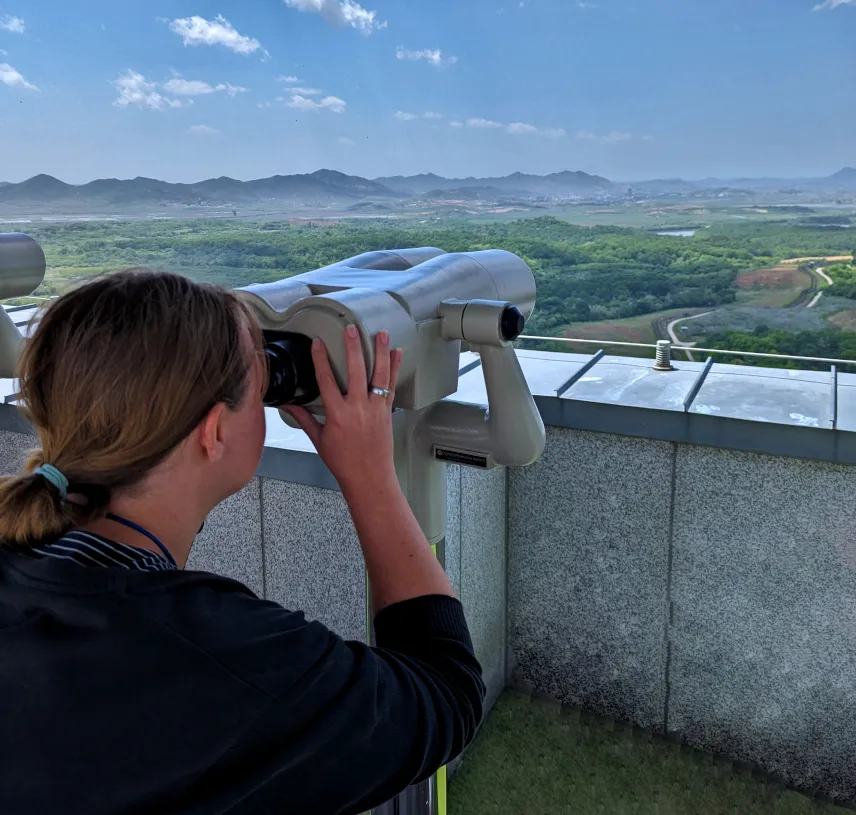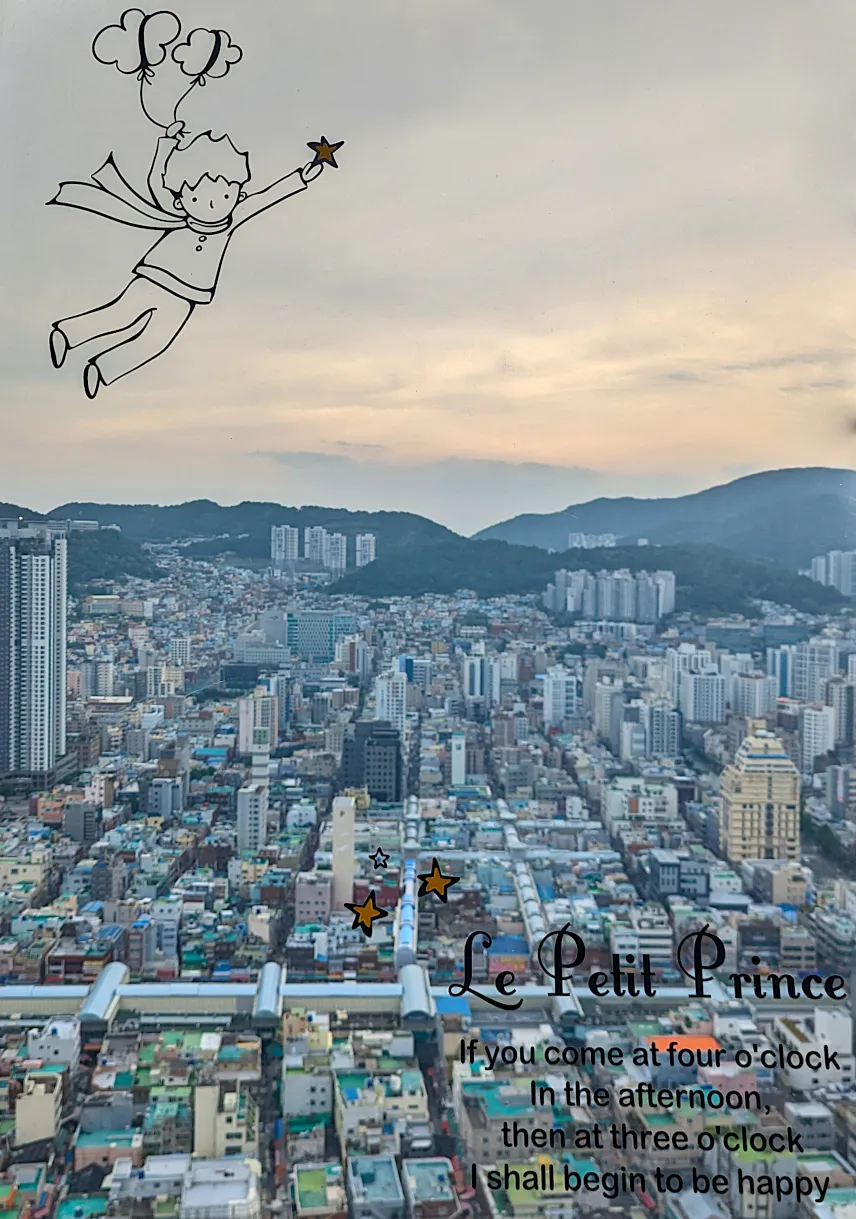
South Korea 10 Day Itinerary (+ Map)
TL;DR
You have 10 days in South Korea, we have the perfect 10 day Korea itinerary.
We have a confession: We only visited South Korea because flights back home were cheaper than from Japan. In hindsight, we are super glad that we did because this country absolutely blew us away.
We decided to skip Jeju Island and focus on the history and culture of the mainland instead – and we can fully recommend this schedule.
For our Korea travel itinerary, we spend
- 4 days in Seoul
- 2 days in Andong
- 2 days in Gyeongju
- 2 days in Busan
- 10 Day South Korea Itinerary
- 10 Days Itinerary South Korea Map
- South Korea Travel Itinerary Note
- Day 1: Seoul – History and Culture
- Day 2: Seoul – Gangnam, Hongdae, and Itaewon
- Day 3: Seoul – Day Trip to the DMZ
- Day 4: Seoul – Modern Seoul
- Day 5: Andong – Day Trip to Hahoe Folk Village
- Day 6: Andong
- Day 7: Gyeongju
- Day 8: Gyeongju – Day Trip to Bulguksa Temple
- Day 9: Busan – Downtown
- Day 10: Busan – Haeundae
- Where to Next?
10 Day South Korea Itinerary
10 Days Itinerary South Korea Map
South Korea Travel Itinerary Note
You’ll be travelling a small country. Your longest transfer time on this itinerary in South Korea is 2.5 hours. You can easily decide whether you want to transfer in the evenings to start your day exploring, in the mornings, to enjoy the nightlife, or even during the day.
Day 1: Seoul – History and Culture
Morning
Seoul is the capital of South Korea and most probably the place where you’ll arrive.
Start your first day in Korea at Seoul City Hall. Seoul Metropolitan Library right next to it has a free photo exhibition as well as a free rooftop garden.
From here, stroll to Gwanghwamun Square, the main square of Seoul. Enter Gyeongbokgung Palace, the main palace of Seoul, via Gwanghwamun Gate. The area is huge with several courtyards, buildings, pavilions, and gates.

Some optional stops along the way are
- Deoksugung Palace
- Seoul Museum of Art
- Seoul Museum of History
- National Museum of Korean Contemporary History
- National Folk Museum of Korea
- National Museum of Modern and Contemporary Art
Afternoon
After your lunch break, head to Bukchon Hanok Village. It’s a lovely area full of traditional Korean houses (Hanoks). Nowadays, it’s a very popular picture spot.
If you’re not all “palaced out” yet, we recommend you to head to Changdeokgung and Changgyeonggung Palace.
If you can’t be bothered to see another palace, head to your first shrine of the day, Jongmyo, the oldest royal Confucian shrine preserved.
Next, stroll through Ikseon-dong Hanok Village to reach Insadong, Seoul’s art district. If you’re interested, you can pop into some of the galleries here.
We suggest Jogyesa Temple, the main temple of the Jogye school of Zen Buddhism in Korea, as your last stop of the day.

Where to Stay in Seoul
We stayed at Seoul Cube Jongro. The location was amazing. The capsules were comfy and clean and so were the bathrooms. We absolutely loved the free breakfast in the morning which we could prepare ourselves!
Day 2: Seoul – Gangnam, Hongdae, and Itaewon
Morning
Make your way to Gangnam in the morning. Check out Bongeunsa Temple, COEX Mall with Starfield Library as well as the Statue of Gangnam Style.

Afternoon
Next, head over to Hongdae. While it’s not full of sights, it’s a very young neighbourhood full of cafes, restaurants, and boutiques. Stroll down Hongdae Street and try some of the street food. Or how about some chicken and beer at Chicken and Beer Street?
Last but not least, head to Itaewon, Seoul’s international district. Check out Little Vietnam, Little Arabia or World Food Street. This is also the prime pub crawl destination in Seoul.

Day 3: Seoul – Day Trip to the DMZ
Personally, we think a tour of the DMZ, the demilitarized zone between North and South Korea, belongs on every Korea bucketlist.

We visited
- 3rd Invasion tunnel
- Dora Observatory
- Imjingak
- Unification Village
- Mt. Gamaksan Suspension Bridge
with DMZ Adventure and can fully recommend it. We have written a complete review of our DMZ Tour from Seoul.
Day 4: Seoul – Modern Seoul
Morning
For spa lovers like us, visiting a Korean spa was a must. We opted for Jongro Sauna as it was close to our accommodation and very affordable.
Hitting one of the many markets in Seoul is a must for food lovers (which we are as well). Gwangjang Market might be the most famous in the country. It was featured in Netflix's “Street Food: Asia” series. And of course, the infamous Anthony Bourdain ate here.

Afternoon
Stroll down the Cheonggyecheon Stream towards DDP (Dongdaemun Design Plaza). DDP with its plethora of art and history is one of the coolest buildings in Seoul.
Next, head to Namsan Seoul Tower. It is set on the top of Namsam Mountain and offers 360-degree views across Seoul. Namsan Seoul Tower is also a great spot to watch the sunset!
Later, hit Myeongdong, one of Seoul's main shopping and tourism districts. In case it’s getting late and you’re craving a snack, there’s even a night market here.
We have written a complete 4 days in Seoul itinerary (including a map) if you want more details!
Day 5: Andong – Day Trip to Hahoe Folk Village
Morning
Andong is famous for its folk heritage.
Start your first day in Andong by ticking off the highlight of your Andong bucketlist: Hahoe Folk Village. Hahoe Folk Village is one of the most famous folk villages in Korea. The Ryu clan has lived here for 600 years and they still make up 70 percent of the villagers today!
You can walk around the village and explore several residences and pavilions. The Hahoe World Mask Museum is included in your entrance fee!
Our personal highlight was the Hahoe Mask Dance Drama which was surprisingly unhinged.
We have written a complete Hahoe Folk Village travel guide (including a map) if you want more details!
Afternoon
In case you’re hungry after your adventures in Hahoe, head to Andong Gu Market to taste some delicious Jjimdak.
Afterwards, we recommend a little stroll through downtown Andong and the Nakdong River Musical Fountain Show to end your day.

How to Get from Seoul to Andong
You can either take the bus or the train. We took the bus.
Bus |
Train |
|
|
Where to Stay in Andong
We stayed at Queen Motel Andong and could not recommend it any more. The location is absolutely perfect. Our room was large, clean, and super well-equipped. The staff was amazing. You can get free hot drinks in the lobby all day round and there’s also a very basic free breakfast in the morning.
Day 6: Andong
Morning
Hop on the bus to Bongjeongsa Temple, the largest Buddhist Temple in Andong.

Afternoon
There’s loads more to explore in Andong. We recommend starting with the Andong Traditional Cultural Contents Museum and Okjeong-dong Hanok Village right next to it.
If you’re into street art, you shouldn’t miss Seongjingol Mural Village, Andong’s very own cultural village.
From here, it’s an easy stroll to the seven-story brick pagoda at Beopheungsa Temple and further up Nakdong River on the newly constructed promenade on the southern river bank.
Eventually, you’ll reach the Municipal Folk Museum and Andong Folk Village where you can learn more about the folk heritage of Andong.
The nearby Wolyeoung Bridge, the longest wooden bridge in Korea, is especially beautiful around sunset.
Depending on your timing, we recommend having dinner either at Andong Soju Museum or Andong Food Street.
We have written a complete Andong travel guide and itinerary (including a map) if you want more details!
Day 7: Gyeongju
Morning
Gyeongju is also known as “museum without walls”. So put on your walking shoes and explore all of the amazing historical sights.
Start with what we consider to be the city's highlight: The Daereunwong Tomb Complex. They are a complex of ancient burial mounds from the Silla period which form a very unique landscape.
Exit towards the south to get to Cheomseongdae Observatory, the oldest surviving observatory in Asia.
From here, it’s an easy walk to Gyeongju Gyochon Traditional Village where you can explore traditional Korean Hanoks as well as the scenic Woljeong Bridge.

Afternoon
Next, make your way to Gyeongju National Museum which is devoted to relics of the Silla kingdom.
If you still have the time and energy, you can also explore Donggung Palace and Wolji Pond, the Hwangnyongsa Temple Site, and Bunhwangsa Pagoda.
Jungang Night Market is a nice spot for dinner.

How to Get from Andong to Gyeongju
We think a bus is the most convenient option to get from Andong to Gyeongju.
Bus |
|
Where to Stay in Gyeongju
We stayed at Han Jin Hostel and enjoyed it a lot. While the rooms are quite basic, the location is amazing and the owner an absolute gem!
Day 8: Gyeongju – Day Trip to Bulguksa Temple
Morning
Start your day by taking the bus to Bulguksa Temple. The large temple complex is considered as a masterpiece of the golden age of Buddhist art in the Silla kingdom.
From here, you can hop on another bus to Seokguram Grotto, the representative cave temple of Korea.

Afternoon
Head to Hwangnidan Street, the main street of Gyeongju. It is lined with cafes, restaurants, and shops. The side streets are filled with cute cafes and street art.
We have written a complete Gyeongju travel guide and itinerary (including a map) if you want more details!
Day 9: Busan – Downtown
Morning
Busan is Korea’s second-largest city and the perfect blend of beach vibes with urban comforts.
Start your exploration of downtown Busan at Jagalchi Market, Korea's largest seafood market. Afterwards, walk to the heart of Busan, BIFF Square.
From Gwangbok-ro shopping street, take the free Yongdusan Park Escalator to get up the hill to Busan Tower where you can enjoy 360° views over Busan.

Afternoon
In the afternoon, head to Gamcheon Culture Village, a cultural village like many others in Korea: Full of colourful houses, alleys, and street art.
Your last stop of the day will be Songdo Beach where you can explore the artificial Songdo Waterfall and the Songdo Cloud Trail.
From here, you can take the Busan Air Cruise cable car to Songdo Sky Park. Here, you can explore Amnam Park and walk across Songdo Yonggung Suspension Bridge to Dongseom Island.

How to Get from Gyeongju to Busan
We think the train is the better option to get from Gyeongju to Busan.
Bus |
Train |
|
|
Where to Stay in Busan
We stayed in Sohostel Korea. The owner speaks perfect English and goes above and beyond with his hospitality. There’s a lovely common area with video games and a well-equipped kitchen with free coffee and tea.
Day 10: Busan – Haeundae
Morning
On your last day in Korea, head to Haeundae. Check out Gunam-ro Street and Haeundae Market on your way to the beach.
Haeundae Beach is a nice place to spend the morning – even if it’s not beach weather. It’s where SEALIFE and Busan X the Sky, Korea’s second tallest building, are located.

Afternoon
In the afternoon, take the Haeundae Beach Train or Haeundae Sky Capsule along the coast of Busan. Once you make it to Songjeong Beach, you can relax and watch the surfers.
If you still have the time and energy, you can make your way further up the coast to Haedong Yonggungsa Temple, one of Korea’s most important temples with a beautiful-looking setting on the cliffs overlooking the sea.
We have written a complete 2 days in Busan itinerary (including a map) if you want more details!
Where to Next?
You can either make your way back to Seoul or take the ferry from Busan to Fukuoka in Japan.
Disclaimer: This post contains affiliate links. If you use these links to buy something we may earn a commission. You would help us a lot if you do so. Thanks.








